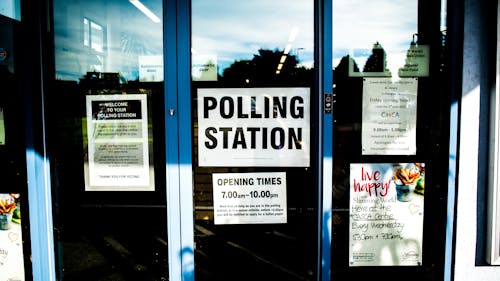SUBRAMANIAN: Voting age must be lowered to 16
Column: Whadda I Know

It is that time of year. Campaign ads play on TV, stickers supporting candidates are put on computers and RU Voting interns outrank spotted lanternflies as the most persistent annoyance on campus. During this time, many politicians come out to Rutgers in hopes of turning out the youth vote.
For example, Sen. Bernie Sanders (I-Vt.) came to Rutgers in October 2021 to campaign on behalf of Gov. Phil Murphy (D-N.J.) during his bid against Republican candidate and former state Rep. Jack Ciattarelli. But if these politicians actually cared about the youth vote and creating a stronger, healthier democracy, they would call to lower the voting age to 16.
On the surface, I can acknowledge the fact that this does not sound good. Giving these teenagers who have just entered high school the power to vote makes no sense. But, on the contrary, data collected by researchers and global examples prove that lowering the voting age makes logical sense.
Many countries outside of the U.S. have already lowered the voting age to 16. These countries include Austria, Brazil, Argentina and Ecuador. Furthermore, certain U.S. jurisdictions have lowered the voting age. For example, the city of Takoma Park, Maryland, lowered the voting age to 16 in 2013. Similarly, the city of Berkeley, California, lowered the voting age to 16 for school board elections.
What this proves is that the idea of lowering the voting age is not a new idea, but one that could be widely implemented. Now that this has been established, it is time to look at the overall effects.
One of the most profound effects of lowering the voting age has been the increase in voter turnout. For example, a 2012 study that looked into the effects of Austria’s decision to lower the voting age to 16 found that the 16- to 17-year-old demographic had the second highest interest in politics out of groups that were below the age of 30. Not to mention, the study also found that 16- to 17-year-olds were highly likely to participate in other forms of non-voting democracy such as protesting and volunteering on campaigns.
Seeing the March for Our Lives protests in 2018, Black Lives Matter protests in 2020 and the recent climate and labor strike that happened here at Rutgers on September 23 shows that youth are engaged and deserve to have an even louder voice in political decisions.
After dealing with this point, the next question asks if the quality of these votes is good. Many opponents of lowering the voting age say that these 16-year-olds are too young and thus not mature enough to vote. But that could not be further from the truth.
Sixteen and 17-year-olds share the same cognitive capacity as those 18 and above, according to research conducted in 2009 by Laurence Steinberg.
Steinberg explains this by presenting two types of cognition: cold and hot. Cold cognition would be thinking that happens in calm, controlled environments that can be measured by attention and logical reasoning. Hot cognition is thinking that happens in much more hurried, stressful environments.
Steinberg found that cold cognition, the type of thinking most likely to happen in voting, is fully developed by the time one is 16 years old. Hot cognition on the other hand only fully develops in the early 20s.
What this means is that the maturity needed to vote is fully developed at 16, meaning that 16-year-olds would be able to make high-quality, informed decisions and be able to use logic skills to pick the candidate of their choice — just like their older peers have the ability to do.
Not to mention, in terms of civic knowledge, research conducted by Daniel Hart and Robert Atkins found that “on measures of civic knowledge, political skills, political efficacy and tolerance, the 16-year-olds, on average, are obtaining scores similar to adults.” Synthesizing these two points together, the evidence on brain development and knowledge point in favor of lowering the voting age.
In the Declaration of Independence, former President Thomas Jefferson wrote that “to secure these rights, Governments are instituted among Men, deriving their just powers from the consent of the governed, that whenever any Form of Government becomes destructive of these ends, it is the Right of the People to alter or abolish it.”
The fact is that the U.S. government is falling short of the ideals the founders created for it. The fact that 16 and 17-year-olds have the same mental capacity, civic knowledge and capabilities in other countries to vote yet do not have the right to do so in the U.S. is rather unfair. In a country where only 39 percent of those 18 to 24 turnout for local elections, the youth vote is lacking in value.
By granting 16 and 17-year-olds the right to vote, it would make the youth vote matter and make politicians more responsive to the next generation. But hey, whadda I know?
Kiran Subramanian is a junior in the School of Arts and Sciences majoring in economics and political science. His column, "Whadda I Know," runs on alternate Tuesdays.
*Columns, cartoons and letters do not necessarily reflect the views of the Targum Publishing Company or its staff.
YOUR VOICE | The Daily Targum welcomes submissions from all readers. Due to space limitations in our print newspaper, letters to the editor must not exceed 900 words. Guest columns and commentaries must be between 700 and 900 words. All authors must include their name, phone number, class year and college affiliation or department to be considered for publication. Please submit via email to oped@dailytargum.com by 4 p.m. to be considered for the following day’s publication. Columns, cartoons and letters do not necessarily reflect the views of the Targum Publishing Company or its staff.



